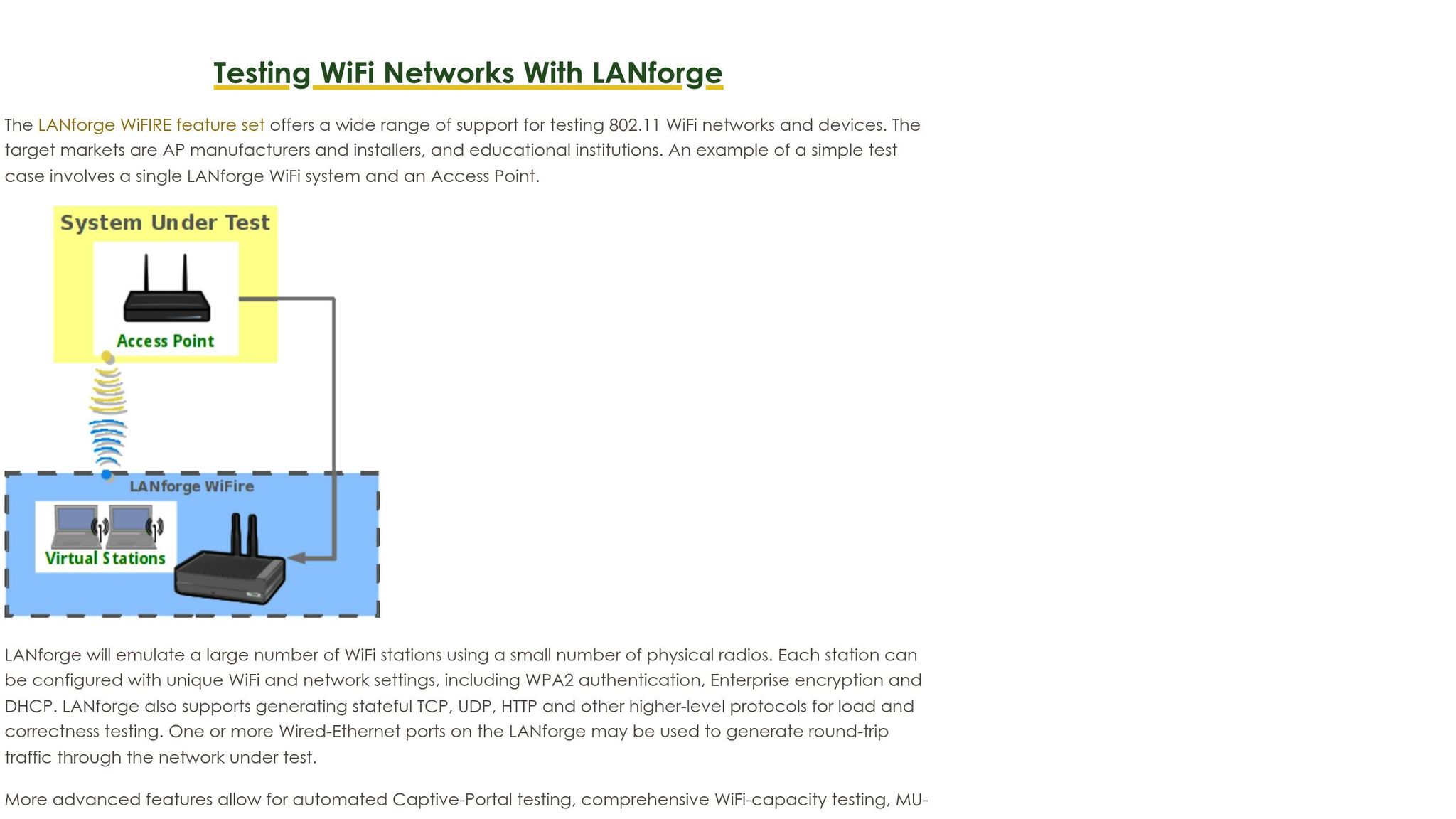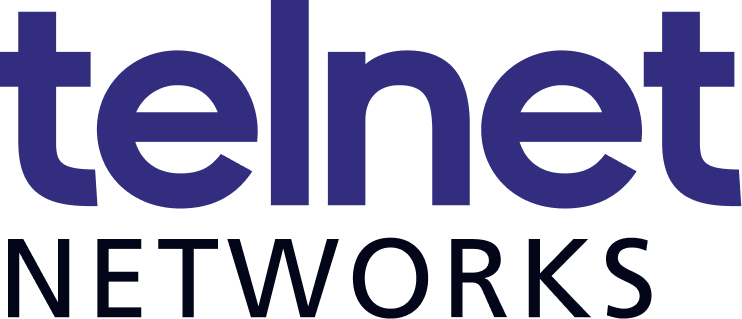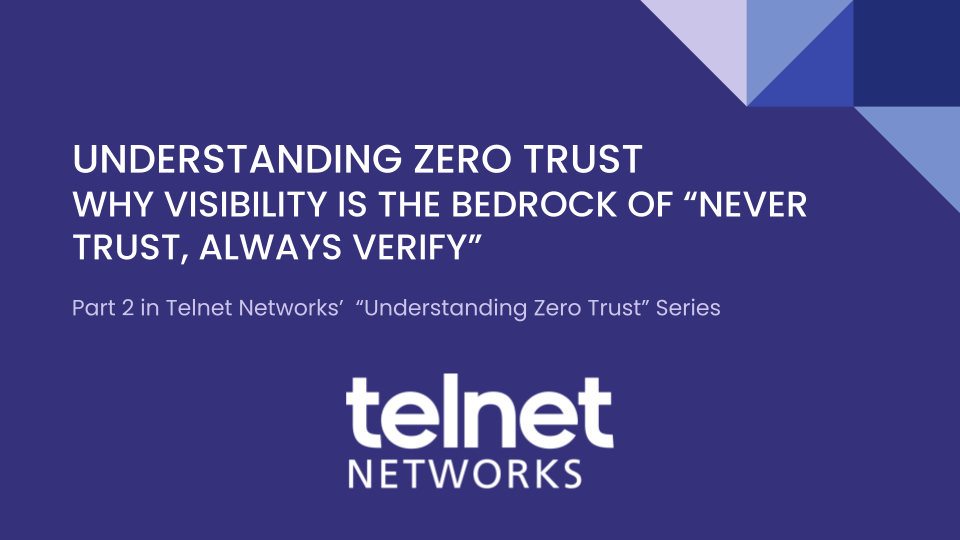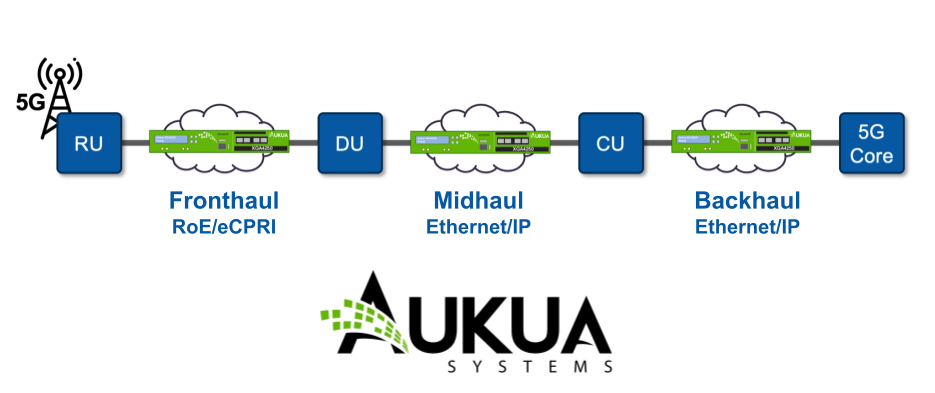Testing Wi-Fi performance is critical for ISPs to ensure fast, reliable connectivity for customers. Candela Technologies offers advanced tools like the LANforge Wi-Fi Capacity Test and TR-398 Wi-Fi Performance Test to help ISPs identify issues, optimize networks, and prepare for emerging standards like Wi-Fi 7. These tools simulate real-world conditions, measure key metrics like throughput and packet loss, and provide actionable data for improving service quality. Partnering with Telnet Networks, ISPs gain expert support for deploying and managing these solutions efficiently, reducing costs and enhancing customer satisfaction.
Portable Candela LANforge Wi-Fi Test System

Candela’s Main Wi‑Fi Testing Tools and Methods
Given the critical role Wi‑Fi plays for ISPs, Candela Technologies offers specialized tools designed to diagnose and improve network performance. Their suite of testing tools provides insights into how Wi‑Fi behaves under real-world conditions, helping ISPs identify bottlenecks and enhance service quality.
LANforge Wi‑Fi Capacity Test
The LANforge Wi‑Fi Capacity Test is a powerful tool that simulates hundreds of virtual stations on a single access point, exposing scalability limits. It incrementally generates both download and peer-to-peer traffic, measuring key metrics like throughput, fairness, and packet loss. ISPs can customize the tool to use UDP or TCP protocols, adjust payload sizes, and set specific data rates. The test duration is also configurable, allowing adjustments based on the number of stations, increment intervals, and setup timeouts.
This tool offers the convenience of unattended operation through command-line scripts, making it ideal for routine monitoring. Results are displayed in a real-time graphical interface, providing immediate insights. By addressing scaling challenges, this test is particularly useful for high-density environments where coverage gaps often occur.
TR‑398 Wi‑Fi Performance Test
The TR‑398 Wi‑Fi Performance Test is a fully automated, standardized testing framework developed by The Broadband Forum. It evaluates access point performance across 11 scenarios, focusing on critical aspects like throughput, coverage, stability, interoperability, and connectivity. According to QA Cafe, this structured approach ensures consistent and reliable assessments under controlled conditions.
The test measures various performance metrics, including RF performance, coverage, and capacity. Specific evaluations include receiver sensitivity, maximum connection capacity, maximum throughput, airtime fairness, dual-band throughput, and bidirectional throughput. The latest version, TR‑398 Issue 3, incorporates updated security protocols and expands its scope to include newer technologies such as 5G, IoT, and SD‑WAN. This standardized methodology enables ISPs to objectively compare access points and configurations, aiding in the delivery of better customer experiences.
Wi‑Fi Mesh and Traffic Generation Tools
Candela’s LANforge Wi‑Fi Mesh Test Solution is designed for automated testing of complex mesh networks in lab environments. Using RF cabling, the system controls access and backhaul links, supporting up to six-node mesh setups and 4×4 MIMO testing. It evaluates critical areas such as data plane performance per hop, station load balancing, fast roaming (802.11k/v/r), auto channel selection, and link failover. Key metrics include throughput, latency, packet loss, roaming delays, and network performance over varying distances.
As Ben Greear, CEO of Candela Technologies, explains:
"We’ve found that Adtran’s commercially available SDG 8700 Wi‑Fi 7 technology matches the performance of other custom‑built test systems. By combining it with our modular solutions for streamlined testing, we’re creating a seamless and cost‑effective way to ensure robust performance for advanced 4×4 MIMO systems. This will help Wi‑Fi equipment manufacturers and broadband providers ensure they provide an outstanding user experience to their customers."
The platform has already delivered impressive results, with initial tests showing throughput exceeding 8.3 Gbps using Wi‑Fi 7 technology. For ISPs that require occasional testing, Candela offers a Test as a Service (TaaS) option. This service provides detailed reports with optimization recommendations, eliminating the need for a full system purchase. These tools are particularly effective in high-density environments, such as mass transit networks, where they can emulate hundreds of roaming users in confined spaces over extended periods. This capability directly addresses congestion issues that often affect customer satisfaction.
How to Use Candela Solutions for Wi‑Fi Optimization
Using Candela’s testing solutions means turning complex network setups into manageable, controlled testing environments. Internet Service Providers (ISPs) can rely on these tools to pinpoint performance issues and fine-tune their Wi‑Fi networks through streamlined, automated testing processes.
Setting Up Test Environments
To create effective test environments, start by configuring attenuators and station emulators to replicate real-world conditions. Candela’s LANforge systems make this process seamless by offering integrated control over key testbed components, such as station emulators, traffic generators, attenuators, and turntables. This unified control eliminates the hassle of juggling multiple systems, allowing ISPs to simulate various network scenarios with ease.
The setup focuses on creating controlled RF conditions to mimic different signal strengths and interference patterns. For example, ISPs can replicate environments like apartment complexes or office buildings where multiple access points compete for bandwidth. The LANforge platform also allows the creation of diverse client profiles, varying in capabilities, MIMO configurations, and behavior patterns. This ensures the testing process captures a wide range of real-world device scenarios customers might face.
By setting up this controlled environment, ISPs can establish a solid foundation for accurate and automated testing.
Running Automated Test Cases
Candela’s automated testing tools let ISPs run extensive test suites with minimal manual effort. These automated tests ensure consistency by executing preconfigured scenarios, such as TR‑398 and data plane tests, which simulate various client behaviors.
The WiFi data plane test, for instance, examines hundreds of variable combinations, including station types, MIMO configurations, channel bandwidths, traffic patterns, and frame sizes. This testing approach quickly identifies recurring issues or trends that need deeper investigation. Since these tests are automated, ISPs can run them overnight or during off-peak hours, freeing up valuable staff time.
For more dynamic testing, the WiFi Client Reset Test replicates situations where multiple clients connect and disconnect rapidly, exposing potential access point weaknesses. Long-duration stability tests, involving several Wi‑Fi clients, push access points to their limits over extended periods to uncover issues like memory leaks or performance degradation.
The insights from these automated tests become the basis for targeted network improvements.
Reading Test Results
Interpreting test results effectively is key to optimizing network performance. Once the tests are complete, Candela’s platform generates detailed HTML and PDF reports that document key performance metrics.
Throughput analysis shows how well the network handles data delivery under varying conditions, while RF performance metrics – like RSSI, SNR, and PHY rates – shed light on physical layer performance. If throughput drops significantly with increased client loads or specific traffic types, it could signal issues like airtime fairness problems. Similarly, dips in RF metrics may point to interference or poor coverage.
Patterns of packet loss in the results can highlight congestion points or misconfigurations that need immediate attention. The reports also track long-term stability metrics, which can reveal gradual performance declines caused by memory leaks or hardware/firmware limitations.
Additionally, connection stability data from TR‑398 tests provides insights into how well access points manage client associations and roaming. Weak performance in these areas can directly affect the user experience, making them critical targets for optimization.
sbb-itb-f59d864
Benefits: How Candela Improves ISP Wi-Fi Deployments
Candela’s testing solutions bring practical tools to the table, helping ISPs improve both service quality and network efficiency. These tools tackle the challenges of real-world Wi-Fi deployments head-on.
Faster Problem Detection and Fixes
Candela’s automated testing framework significantly reduces the time it takes to identify and resolve issues. With the LANforge platform, ISPs can simulate hundreds of clients, mimicking high-density network scenarios that are nearly impossible to recreate manually. Problems that might take weeks to surface in live networks can now be uncovered within hours.
When network bottlenecks appear, LANforge’s station testing can analyze how client devices respond. By emulating real-world conditions – like packet latency, jitter, and packet loss – the platform helps pinpoint whether the issue lies with the access point, the client device, or external environmental factors.
The Rate vs Range test is another valuable tool. It identifies coverage gaps, allowing ISPs to optimize access point placement and antenna configurations before deployment. This proactive testing eliminates the need for multiple site visits and reduces customer complaints. By addressing potential issues early, ISPs can avoid costly truck rolls and make smarter, data-backed decisions about their networks.
Data-Based Network Optimization
Candela’s testing generates actionable data that guides ISPs in making informed infrastructure choices. The platform’s reporting system captures vital metrics, such as client loads, traffic patterns, and RF conditions, providing a clear picture of network behavior under different scenarios.
For example, interference testing helps ISPs assess network stability in crowded RF environments, like apartment buildings or business districts, where multiple networks compete for spectrum. This data can inform decisions about adding access points, reassigning channels, or upgrading equipment to improve performance.
Candela’s ability to test in a variety of settings – from controlled RF chambers to real-world environments – gives ISPs the flexibility to validate both theoretical and practical performance. This two-step approach ensures that optimization efforts are grounded in reliable data rather than assumptions.
With LANforge InterOp testing, ISPs can measure how real devices and applications perform on their networks. This allows them to identify which devices or apps create the heaviest network loads and adjust their infrastructure accordingly. It also prepares ISPs to adopt new Wi-Fi standards with confidence, ensuring their networks are ready for the future.
Support for New Wi-Fi Standards
Candela’s modular testing architecture is designed to help ISPs smoothly transition to emerging standards like Wi-Fi 7. As Wi-Fi 7 adoption is projected to grow from under 1% in 2024 to more than double by Q1 2025, ISPs need reliable tools to test and validate new equipment before rolling it out to customers.
Wi-Fi 7 promises speeds of up to 46 Gbps – 4.8 times faster than Wi-Fi 6E . However, achieving these speeds in real-world conditions requires thorough testing. Candela’s solutions can validate key features like Multi-Link Operation (MLO), which allows data to travel across multiple frequency bands simultaneously, as well as the expanded 320MHz channel bandwidth, ensuring that performance improvements meet expectations.
Customer satisfaction hinges on delivering reliable service. While Net Promoter Scores jump from -38 for Wi-Fi 4 to +45 for Wi-Fi 7, this improvement only happens when the technology performs as intended. Given that 71% of U.S. internet households receive their routers directly from their ISP, proper testing is crucial for maintaining strong customer relationships.
"Wi-Fi 7 helps users overcome congestion and interference in large or crowded venues – like conferences or stadiums – bringing improved user experiences in areas with densely packed devices or neighboring networks that overlap." – Maureen Gallagher, vice president of marketing at Wi-Fi Alliance
Candela’s platform ensures ISPs can validate these advanced capabilities before deploying Wi-Fi 7 in challenging environments. Backward compatibility testing also confirms that existing customer devices will work seamlessly with new Wi-Fi 7 access points, avoiding service disruptions during upgrades.
| Wi-Fi Standard | Maximum Speed | Channel Width | Customer NPS |
|---|---|---|---|
| Wi-Fi 6 | Up to 9.6 Gbps | Up to 160 MHz | Not specified |
| Wi-Fi 7 | Up to 46 Gbps | Up to 320 MHz | +45 |
Additionally, the platform supports testing for WPA3 security enhancements in Wi-Fi 7, enabling ISPs to validate both performance and security upgrades simultaneously. This reduces deployment risks and helps ISPs bring new services to market more efficiently.
Working with Telnet Networks for Candela Testing Solutions
For over 25 years, Telnet Networks has been at the forefront of helping ISPs streamline network deployment and management, leveraging Candela’s advanced Wi‑Fi testing tools. By integrating Candela’s powerful capabilities into ISP networks, Telnet Networks ensures optimized performance and precise testing. This collaboration not only sharpens test accuracy but also bridges the gap between technical expertise and practical implementation.
Expert Help and Support
Telnet Networks and Candela offer customized configuration and deployment services, helping ISPs maximize their investment in Candela’s testing solutions. Their engineers work closely with ISPs to integrate LANforge systems into existing network infrastructures, ensuring smooth operation across diverse environments.
To enhance testing efficiency Telnet and Candela provide ongoing support to help ISPs interpret critical performance metrics, particularly in areas like WiFi traffic generation, stateful traffic generation, and WAN/Network impairment testing. This guidance allows ISPs to quickly translate test results into actionable steps for improving network performance.
Their expertise extends to VoIP/RTP call generation testing, where they assist ISPs in validating voice service quality over Wi-Fi networks. This is especially important for ISPs offering unified communication services, as voice quality directly impacts customer satisfaction and retention. Beyond the testing phase, Telnet Networks provides advanced management tools, giving ISPs the insights needed to maintain long-term network performance.
Additional Network Management Tools
Telnet Networks goes beyond Candela’s testing solutions by offering a comprehensive suite of tools for network visibility, performance management, and security. These tools complement Wi-Fi testing efforts, providing ISPs with the ability to monitor and optimize their networks continuously after initial deployment.
Their network performance management solutions work in tandem with Candela’s testing data, allowing ISPs to establish performance baselines during testing and compare them with actual network performance over time. This approach ensures consistent service quality and helps identify areas for improvement.
Through a global partner ecosystem that includes leading cybersecurity, visibility, and timing specialists from Canada, the USA, and Europe, Telnet Networks gives ISPs access to advanced tools for Layer 2-7 Testing, Production Testing, Environmental Testing, Automation, and Application & Security Testing. These additional resources enable ISPs to move beyond basic Wi-Fi validation and address more complex network challenges.
Telnet Networks focuses on accelerating service deployment while maintaining mission-critical network performance. Their solutions help ISPs transition from testing to production deployment efficiently, reducing the time it takes to launch new Wi-Fi services.
For ISPs catering to medium and large enterprises, communication providers, managed service providers, Crown Corporations, and government agencies, Telnet Networks provides specialized support for complex network environments. Their experience with mission-critical applications ensures that Wi-Fi testing and optimization meet the rigorous standards required by enterprise and government clients.
Timing precision is also a key feature of their offerings. With millisecond-accurate time services, Telnet Networks helps ISPs validate advanced Wi‑Fi 7 features like Multi-Link Operation, ensuring test results reflect real-world performance accurately.
FAQs
How do Candela’s Wi-Fi testing tools help ISPs optimize network performance in real-world conditions?
Candela’s Wi-Fi testing tools are designed to mirror real-world network conditions by simulating key factors such as latency, jitter, bandwidth limitations, and packet loss. This approach helps Internet Service Providers (ISPs) assess network performance in realistic scenarios, making it easier to pinpoint and address potential issues before they affect users.
What sets these tools apart is their ability to test with multiple devices simultaneously, replicating high-traffic environments. This ensures networks are prepared to handle peak usage without compromising performance. By leveraging Candela’s solutions, ISPs can optimize their networks to provide more dependable connections, faster speeds, and a smoother experience for their customers.
How do Candela’s LANforge Wi-Fi Capacity Test and TR-398 Wi-Fi Performance Test help ISPs improve their networks?
Candela’s LANforge Wi-Fi Capacity Test gives ISPs a way to measure how access points perform under different levels of traffic. This helps pinpoint bottlenecks and fine-tune throughput, ensuring networks can handle multiple devices seamlessly – even in busy environments.
The TR-398 Wi-Fi Performance Test offers detailed benchmarks for ISPs to confirm that access points meet industry standards in areas like coverage, stability, and capacity. With this test, ISPs can boost network reliability, provide better user experiences, and maintain consistent, high-quality Wi-Fi that meets customer expectations.
How does Telnet Networks help ISPs maximize the benefits of Candela’s Wi-Fi testing solutions?
Telnet Networks boosts the capabilities of Candela’s Wi-Fi testing tools by integrating their deep knowledge of network emulation and automation. Together, they enable Internet Service Providers (ISPs) to replicate real-world network scenarios with precision, making it easier to pinpoint and address performance issues.
This partnership empowers ISPs to carry out detailed performance evaluations, fine-tune network efficiency, and ensure a smoother, more dependable connection for their users. The outcome? Higher service standards and a noticeably better experience for customers.






